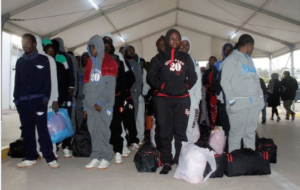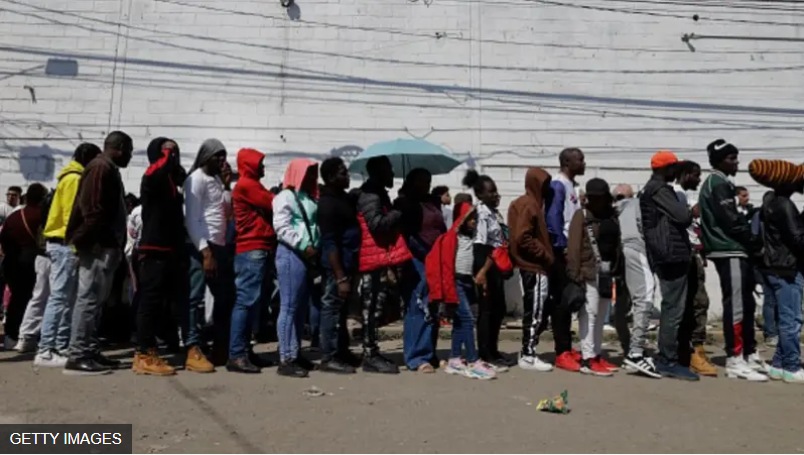By Jemimah Wellington, JKNewsMedia Reporter
WORSENING FEARS over United States immigration policies have forced thousands of undocumented Nigerian immigrants to drastically limit their movements, as President Donald Trump’s administration pushes forward with an aggressive deportation agenda.
Many have withdrawn from public life, skipping work, church services, and community gatherings to avoid potential arrest by Immigration and Customs Enforcement (ICE) officers.
A report from ICE and its Enforcement and Removal Operations division revealed that 3,690 Nigerians are currently on the non-detained docket with final removal orders.
The document, which details deportation cases by nationality, ranks Mexico and El Salvador as having the highest numbers, with 252,044 and 203,822 cases, respectively.
As of November 2024, a total of 1,445,549 non-citizens across various nationalities faced deportation orders.
Since assuming office, President Trump has enacted a series of executive orders tightening immigration laws, including a proposed end to birthright citizenship for children born to undocumented immigrants.
His administration has warned state and local governments of potential legal repercussions if they fail to comply with federal immigration directives.
The White House Press Secretary, Karoline Leavitt, announced via her official X handle that the U.S. is undertaking its largest-ever deportation operation.
Living in Fear: Nigerians Avoid Public Spaces
The escalating crackdown has left many Nigerian immigrants fearful of venturing outside their homes.
A Nigerian migrant in Tampa, Florida, described how life has changed under the new policy.
“Ever since Trump acted on his threat of deportation, many of us have stopped going to work. ICE officers raid workplaces without warning, and it’s too risky,” he explained.
“Churches aren’t even safe anymore. The only place you can avoid arrest is indoors.”
The factory where he works employs numerous Nigerians and other African immigrants, many of whom have also stopped working out of fear.
“The fear of Trump is the beginning of wisdom now,” he remarked, echoing the widespread anxiety among undocumented communities. Still, he remains hopeful that ongoing lawsuits challenging Trump’s policies may slow down or block some of the harshest measures.

A Tough Choice: Stay or Return to Nigeria?
For many, returning to Nigeria is not a desirable option. Economic instability, limited job opportunities, and security concerns weigh heavily on their decisions.
A Nigerian man who migrated to the U.S. in 2013 detailed his struggles to secure legal residency.
“I’ve spent close to $30,000 trying to get my papers, but every attempt has failed. I even considered seeking asylum, but because I had already overstayed my visa for years, my chances were slim,” he lamented.
In Columbus, Ohio, another Nigerian migrant voiced concerns about being targeted, despite not having a criminal record.
“Trump’s war on illegal immigrants has forced us into hiding. We only go out when necessary and always check our surroundings first,” he explained.
“This is like a cat-and-mouse game. If ICE officers find you, that’s it.”
Despite the fear and uncertainty, many insist that returning to Nigeria is not an option.
“Even with all the difficulties here, life in America is still better than what is considered comfortable in Nigeria,” said another migrant.
Nigeria Prepares for Returnees
As of January 23, 538 illegal immigrants have been deported as part of this operation, with over 5,144 Nigerians expected to be affected in the initial stage of mass deportations.
The Nigerians in Diaspora Commission (NiDCOM) has stated that the Federal Government is prepared to welcome deportees back home.
ICE reports indicate that 772 of the 1,454 Nigerians in detention were arrested for criminal offenses, while the rest were detained for immigration violations such as visa overstays.
Between 2019 and 2024, a total of 884 Nigerians were removed from the U.S., with 417 deported in the past year alone.
Deportation methods have raised human rights concerns, particularly after allegations that some migrants were returned to their home countries in degrading conditions.
Colombia, Mexico, and Brazil have condemned the treatment of their nationals during deportation, with Colombian President Gustavo Petro denouncing the use of military aircraft and handcuffs.
Brazil’s foreign ministry also expressed outrage over reports that Brazilian deportees were restrained on commercial flights.
Ongoing Legal Battles and Uncertain Future
Despite legal challenges from civil rights organisations and some Democratic lawmakers, the Trump administration has remained firm on its stance.
The use of U.S. military planes for deportation flights is an unusual measure, highlighting the administration’s determination to remove undocumented immigrants at an unprecedented scale.





